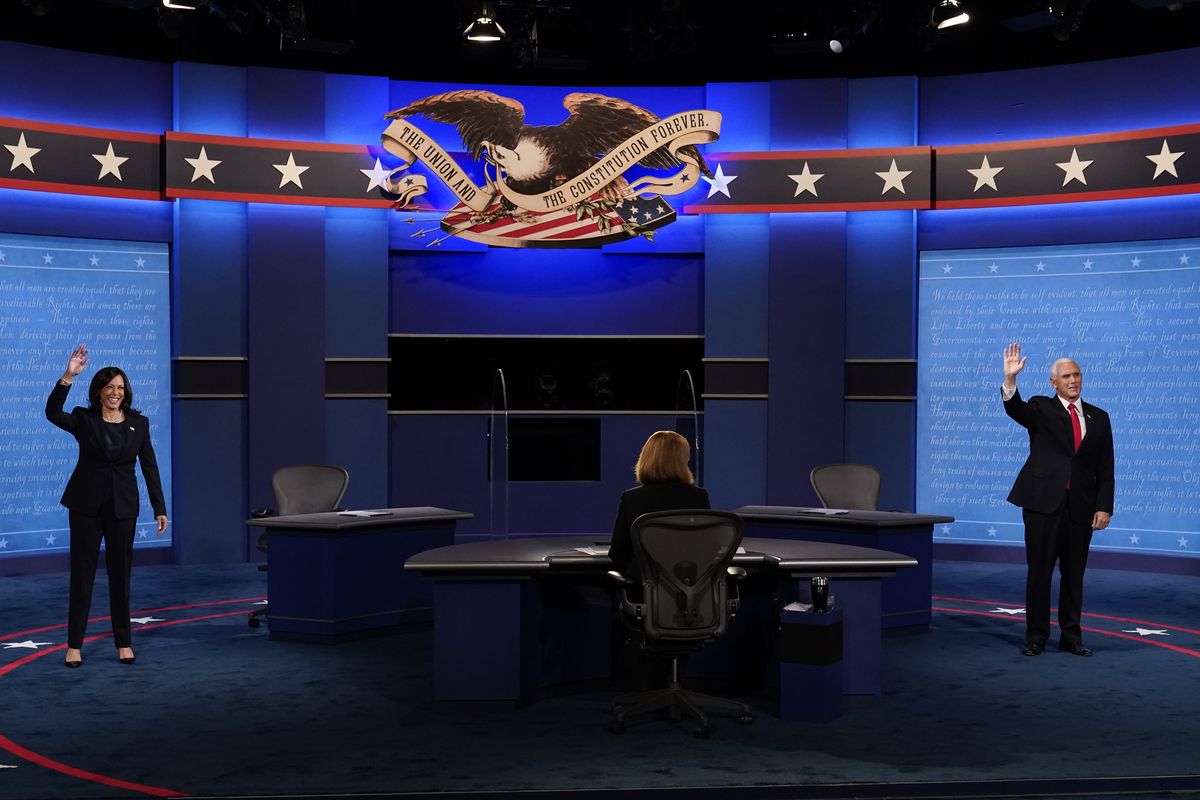Gonzaga debate team members largely unswayed by Harris and Pence’s debate performances

After Vice President Mike Pence and Democratic nominee Kamala Harris faced off in the vice presidential debate Wednesday night in Salt Lake City, students in a virtual debate-watch event co-hosted by Gonzaga University called the debate more civil than the clash between the presidential candidates a week earlier but said the meeting did little to change their viewsof either candidate.
Gonzaga’s debate team co-hosted the virtual debate-watch session along with teams from the University of Minnesota, Georgetown University and the University of Mary Washington.
The event was part of the DebateWatch Initiative, a program created by the Commission on Presidential Debates – an independent group that organizes the debates – whose participants include nearly 200 schools and organizations in 45 states and three countries.
“I left this debate with the same question that I had after the first debate: Who was this debate for?” said Gonzaga student Molly Martin. “I don’t know who is going to move after this debate. I don’t know who would decide their vote (based) on a VP.”
Pence and Harris squared off at the University of Utahin Salt Lake City, sitting 12 feet apart and separated by plexiglass barriers, a request of the Biden-Harris campaign after President Trump and more than 30 White House staffers tested positive for the coronavirus.
During the debate, Harris borrowed an approach her running mate employed a week earlier, frequently turning to the camera and speaking directly to the American people.
Pence, in stark contrast to President Donald Trump’s first debate performance on Sept. 29, took pains to be polite to his opponent. Both candidates mostly avoided interrupting each other, opting instead to grimace and shake their heads while the other was talking.
The Gonzaga team previously held a virtual watch event for the first presidential debate, which quickly devolved into chaos as Trump repeatedly interrupted both his opponent and the moderator and Biden called the president, among other things, “a clown.”
Glen Frappier, director of forensics at Gonzaga, said interactions between attendees of the first virtual event, mirroring the debate itself, got more contentious than the organizers had intended.
Ahead of Wednesday’s event, he said he hoped it would offer “a healthy dose of civil discourse, which is something we could all desperately use right now.”
“We remain hopeful the vice presidential debate will deliver the depth of substantive analysis and civil dialogue that was clearly lacking in the first debate,” Frappier said in a statement announcing the event.
The event kicked off about half an hour before the debate itself with a highlight reel from past vice-presidential debates, followed by video profiles of the two candidates. Organizers polled the roughly 90 attendees throughout the debate and broke the participants into small groups after it concluded.
In the informal Zoom polls, 82% of participants said the debate was more informative than the first presidential debate. Before it began, 79% said they were leaning toward voting for Biden and 13% for Trump. Afterward, 77% said they were leaning toward Biden and 19% toward Trump.
The debate covered COVID-19, the economy, Trump’s Supreme Court nominee and racial justice, but notably dedicated more than 10 minutes to foreign policy, a subject neither campaign has sought to focus on.
“I was just shocked at the amount of time they spent on foreign policy,” said Amber Sety, another Gonzaga student. “I don’t think that resonated with anyone. Those are not hot-button issues that people care about right now.”
Ernest Ntangu, a student at Georgetown University in Washington, D.C., disagreed.
“Personally, I was happy that they got to talk about it extensively, even though I know a lot of people don’t care about foreign policy,” Ntangu said.
In contrast to the presidential debate, both candidates Wednesday mostly avoided interrupting each other, opting instead to ignore Page’s polite attempts to cut them off when their time was up.
In one memorable exchange, the moderator offered Pence 15 seconds to wrap up a response and he said, “I gotta have more than that.”
“It seemed like Harris asked for more time, whereas Pence asserted he already had it,” Martin said. “Harris deferred to the moderator, which to me made her look more respectable.”
Sety agreed and said she saw a double standard in how Pence was able to strong-arm his way to more talking time.
“I was absolutely shocked when she said ‘Thank you, Vice President Pence’ and he said, ‘No, I’d like more time’ and she gave it to him,’ Sety said. “More to the point, when Sen. Harris asked for more time, she was not given it.”